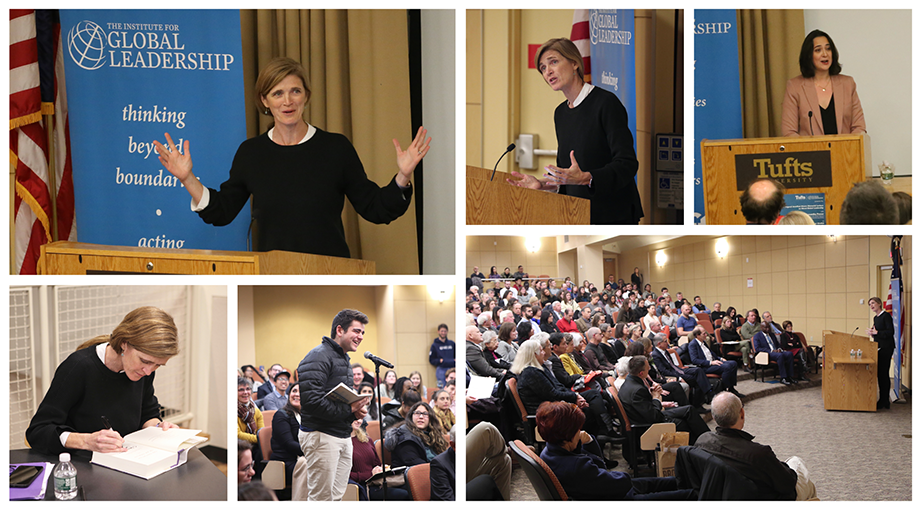The Education of an Idealist: The Inaugural Jonathan Moore Lecture on Moral Global Leadership

On December 4, the Institute for Global Leadership held the inaugural Jonathan Moore Memorial Lecture on Moral Global Leadership to honor the memory and impact of one of its long-standing board members, Amb. Jonathan Moore.
Amb. Samantha Power, former U.S. Ambassador to the United Nations in the Obama Administration and Pulitzer Prize-winning author, gave the inaugural address on “The Education of an Idealist: What I Have Learned Inside and Outside Government”. She is currently the Anna Lindh Professor of the Practice of Global Leadership and Public Policy at Harvard Kennedy School and the William D. Zabel ’61 Professor of Practice in Human Rights at Harvard Law School.
Mr. Moore served six presidents – mostly in the State, Defense and Justice Departments – and the United Nations. He became the first full-time director of the Institute of Politics at the John F. Kennedy School of Government at Harvard, and he was involved in establishing the school’s Shorenstein Center on Media, Politics and Public Policy. At the United Nations, he helped conceive what became its coordinator for humanitarian affairs. As the United States coordinator and ambassador at large for refugees during the Reagan administration, Mr. Moore directed resettlement programs for Palestinians, Mozambicans and Indochinese. While in his late-70s, he still traveled for research to countries such as Afghanistan, Haiti, and Rwanda. He was the editor of Hard Choices: Moral Dilemmas in Humanitarian Intervention.
In her introduction to Amb. Power, IGL External Advisory Board Chair Maria Kupcu said, Amb. Moore was a generous and compassionate person, and someone who always engaged and took time for mentorship, not just for students, but also for faculty. And as a board member, he kept the Institute grounded in some of our core beliefs, the beliefs that continue to guide our mission. One of these is that there is no substitute for bearing witness.”
“’Get close,’ as Ambassador Power has said in some of her speeches. Allow students to get out of the classroom and into the world and experience one of the most powerful things that we can do: understand the different realities of our world, challenging our own mindsets and being brave to confront difficult situations. And in doing do, being able to create leaders with humility and compassion, which we need many more of in this world.”
Kupcu continued, “We hope that this annual lecture will be a moment of reflection and of celebration inspired by the incredible life of Jonathan Moore. And what better way to honor him than to turn to one of his students, and one of his mentees, and one of his most treasured friends. Someone who now inspires us in her own right.”
Amb. Power began her talk noting, “For Jonathan, leadership and morality were not exactly rooted in questions of policy as such – as Jonathan put it, ‘to be moral is to be operational’…thus above all, moral leadership requires an open heart, a searching mind and a readiness to engage tactically and tangibly with people in one’s community.”
She then highlighted four lessons learned that are important to remaining an “unrepentant idealist”: gratitude, the need to have a sustaining network of family and friends, the importance of understanding and recognizing human dignity in all people; and individual service matters.
She began with gratitude, saying, “A disposition for gratitude is an indispensable foundation for sustaining one’s idealism in a very, very and ever messier world.” She went on to quote Cicero, “Gratitude is not only the greatest of all virtues but the parent of all others.”
She concluded her talk with. “For all of the policy prescriptions and the structural reforms that one can offer, Jonathan taught us never to lose sight of the fact that the direction of our communities, our country, and the broader world will always come down to the actions of individuals,”
You can watch Amb. Power’s lecture here.
